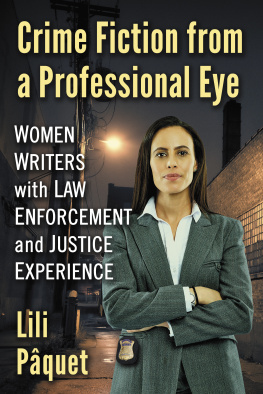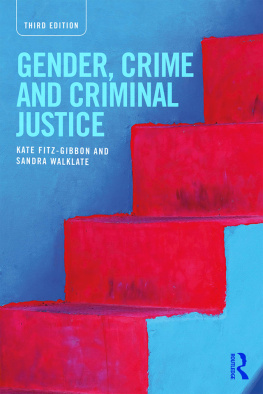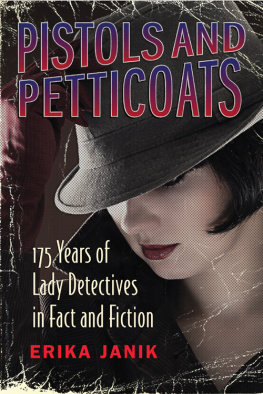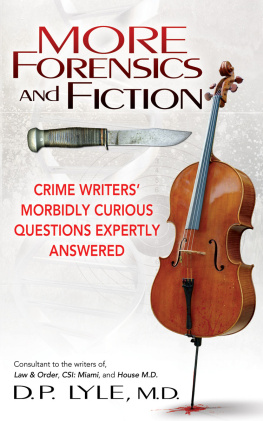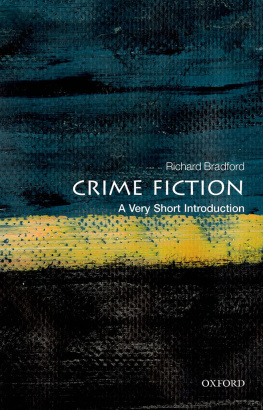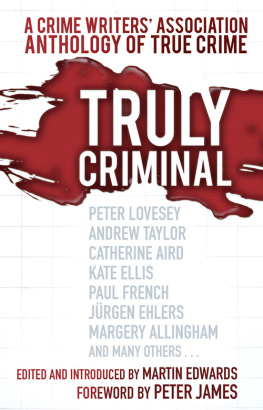
Crime Fiction from a Professional Eye
Women Writers with Law Enforcement and Justice Experience
LILI PQUET

McFarland & Company, Inc., Publishers
Jefferson, North Carolina
LIBRARY OF CONGRESS CATALOGUING DATA ARE AVAILABLE
BRITISH LIBRARY CATALOGUING DATA ARE AVAILABLE
e-ISBN: 978-1-4766-3403-6
2018 Lili Pquet. All rights reserved
No part of this book may be reproduced or transmitted in any form or by any means, electronic or mechanical, including photocopying or recording, or by any information storage and retrieval system, without permission in writing from the publisher.
Front cover photograph by Dean Mitchell (iStock)
McFarland & Company, Inc., Publishers
Box 611, Jefferson, North Carolina 28640
www.mcfarlandpub.com
Preface
As a reader, I have long been interested in crime fiction novels with professional female protagonists. I felt drawn to these women who were both physically and intellectually capable, who represented more than the victim stereotype so often portrayed by female characters in the genre. Recently, there are many female characters that are police officers and detectives, criminal lawyers, and forensic anthropologists. Even more exciting is how some of the authors of these novels are professional women in the same occupations as their protagonists. I studied these authors for my doctoral dissertation, and this book has come out of my research from the past five years. Preparation for the book has included some enjoyable close reading of novels, as well as archival research at Boston University, and consideration of interviews and autobiographies of the authors. I have called these authors professional eyes in order to distance them from the stereotypical private eye genre with its masculine, hardboiled hero.
For the sake of this evaluation, a feminist crime novel is a novel from the crime fiction genre that follows a female protagonist who is professional, independent, capable, and complex. These feminist novels are generally (but not always) written by female authors. As this book concentrates on female authors with professional experience, the feminist novels in this particular study are all authored by women. There have been some overviews of feminist crime fiction, such as Feminism in Womens Detective Fiction (1995), edited by Glenwood Irons, and Women Times Three: Writers, Detectives, Readers (1990), edited by Kathleen Gregory Klein, but more recently little has been written on the topic. Even less exists on feminist crime fiction featuring professional female protagonists. The most instructive text available on the subject is Priscilla L. Walton and Manina Joness Detective Agency (1990), although it mainly centers on private detective protagonists and does not focus on professional authors writing professional protagonists who work within institutions. These characters present an interesting combination of the other and the institution, which deserves more academic attention.
This book begins with an introduction to the topic and its parameters, and then divides into four chapters, each evaluating the work (real and fictional) of a specific author. I examine Dorothy Uhnak, Linda Fairstein (with comparisons to other legal authors such as Lisa Scottoline, Marcia Clark, Alafair Burke, and Pamela Wechsler), and Kathy Reichs (with some comparison to Patricia Cornwell), and then I finish with Australian authors Karen M. Davis, Y.A. Erskine and P.M. Newton. The book concludes with a deliberation on whether the authors impart any of their knowledge of criminal justice institutions into their novels. Much as my own interest in these novels began with my role as a reader rather than an academic, I consider the impact of these authors on a female readership that can now identify with modern, professional heroines.
Part of Chapter Three appeared in an early form in Clues: A Journal of Detection vol. 33, issue 1 (Spring, 2015), pp. 5161. Permissions have been kindly granted for archival materials from the Dorothy Uhnak Collection, Howard Gotlieb Archival Research Center at Boston University. I would like to extend thanks to my early readers: Rebecca Johinke, Stephen Knight, John Scaggs, and Sue Turnbull, and the two anonymous peer reviewers who read an early draft. Special thanks also go to my husband, Sam, and daughter, Sylvie: my most enthusiastic supporters.
Introduction:
The New Female Investigator
In 1979, Carolyn G. Heilbrun published her book Reinventing Womanhood in which she claims, Women writers, like successful women in male dominated professions, have failed to imagine autonomous women characters. With remarkably few exceptions, women writers do not imagine women characters with even the autonomy they themselves have achieved (71). Heilbrun, an academic and professor from Columbia University, published nonfiction feminist titles under her own name as well as the Kate Fansler crime series under the pseudonym Amanda Cross (an act that did little in itself to help the point she was trying to make). Almost a decade later, Maureen T. Reddy argued a similar view as Heilbrun, writing:
If the woman detective in crime fiction remains relatively rare, the female series character is rarer still. One possible reason for this is that employment discrimination on the basis of sex has barred women from jobs as police detectives or private investigators until fairly recently, leaving crime novelists who wanted plausible female protagonists with only the option of gifted amateurs, like Christies Miss Marple [Sisters in Crime 6].
Marcia Muller, Sara Paretsky and Sue Grafton are among those authors who began to introduce professional women as protagonists of crime fiction from the 1970s onwards. The popularity of these authors revealed the readership of women who appreciated the tough female investigator challenging gender stereotypes, and proved inspirational for increasing numbers of female crime authors. In their 1999 book Detective Agency, Priscilla L. Walton and Manina Jones graph the radical leap in numbers of professional female investigators in crime fiction, revealing how it had tripled in the decade since Reddys observation (29). Professional female investigators in crime fiction have increased rapidly since the 1970s, one of the most significant developments in the genre, and yet little has been written about the change. That gap is where this book sits within the critical debate, with a focus on professional women in crime fiction, as both protagonists and authors. This book focuses on professional women who have worked within the criminal justice system in positions directly involved in the prosecution and investigation of crime. These professionals include police officers, forensic technicians, and prosecutors. This focus does not aim to negate the importance of private detectives, but to provide research on the ways professionals approach legal and policing institutions from within. How has this development changed the direction of feminist crime fiction? Is there a difference between the novels of crime fiction authors with professional experience to those without? How does it reflect real feminist gains in the criminal justice system? Women are now imagining protagonists with the professional autonomy they themselves have gained, and the fiction of former criminal justice professionals provides readers with plausible protagonists. To answer the overall research questions I explore fiction and nonfiction authored by these women, who are henceforth termed professional eyes or ex-professional authors.
Next page
